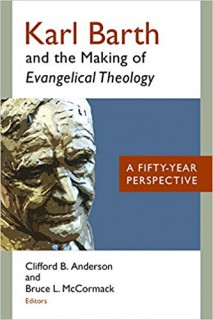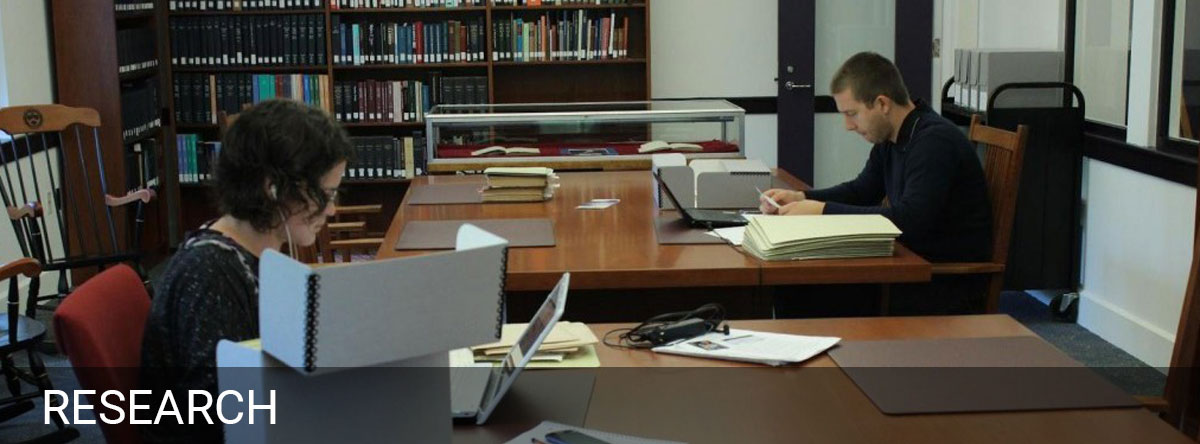 Clifford B. Anderson and Bruce L. McCormack, eds., Karl Barth and the Making of Evangelical Theology: A Fifty-Year Perspective (Grand Rapids: Eerdmans, 2015) v + 237 pp. $34.00 (paperback).
Clifford B. Anderson and Bruce L. McCormack, eds., Karl Barth and the Making of Evangelical Theology: A Fifty-Year Perspective (Grand Rapids: Eerdmans, 2015) v + 237 pp. $34.00 (paperback).
Reviewed by Brandon Watson (April 09, 2019)
As Barth notes in the opening commentary to Evangelical Theology: An Introduction (ET), the added term “evangelical” should not be understood “in a confessional, that is, in a denominational and exclusive sense” (ET, 5). The same clarification is needed for this volume of collected essays edited by Clifford B. Anderson and Bruce L. McCormack. The book is not concerned with Evangelical-ism, but with the celebration of the publication of Karl Barth’s ET. Additionally, the book commemorates the 200-year anniversary of the founding of Princeton Theological Seminary in 1812 and are the proceedings from the 2012 Annual Karl Barth Conference. They offer an intriguing insight into the multi-vacated theme of the conference as well as Barth’s 1962 venture to the U.S. and his fascination, and somewhat complicated relationship, with American ideologies (cf. CD I/1, 73). The essays are organized under four rubrics: Historical Perspectives, Doctrinal and Ethical Perspectives, Dialogue with American Theologians, and Theological Existence in America. These different angles provide a unique perspective on Barth’s historic visit to America as well as how American theology has been shaped over time.
Historical Perspectives
Hans-Anton Drewes, Director Emeritus of the Karl Barth-Archiv, opens the section on Historical Perspectives by analyzing the development of a cluster of doctrinal concerns from Christology to the sacraments in Barth’s thought. Pulling from archival materials, letters, and theological writings, Drewes traces Barth’s train of thought from 1917 to 1967. Taking the form of a hermeneutic of “loyalty,” Drewes shows how Barth remained doctrinally consistent throughout his theological development, while also showing Barth’s own retrospective surprise at his earlier consistency. The fundamental challenge Drewes offers the reader, especially those who wish only to consult the Church Dogmatics for cherry-picked material, is: “Can we understand the teaching of the Church Dogmatics if we do not try to follow its entire course of motion—not in a doctrinal, but in a hermeneutical, loyalty” (28)?
In chapter 2, David W. Congdon, Acquisitions Editor at the University Press of Kansas, places Barth’s ET, as well as some of Barth’s later writings, into their wider, historical and theological context by investigating Barth’s engagement with his career-long existentialist interlocutor, Rudolf Bultmann. The essay highlights the key differences and similarities between Bultmann’s “anthropotheology” and Barth’s “theanthropology,” and seeks to overcome the seeming impasse between the two. After working through the hermeneutical and dogmatic nuances of their positions, Congdon concludes: “Bultmann without Barth lacks the dogmatic basis for mission, but Barth without Bultmann lacks the hermeneutical logic of mission” (62). Interpreting these two theologians alongside one another creates the possibility for a theology that can be both missional-oriented and dogmatically-based, in order to face the concrete challenges of our contemporary situation.
While in the United States, Barth was able to visit three correctional facilities in Chicago, California, and New York. Chapter 3, written by Jessica DeCou, presents an in-depth look into each of the facilities Barth visited. Historically reconstructing Barth’s visits to these facilities, one of which he went on to describe as “Dante’s Inferno on Earth,” DeCou sheds light on the increasing reality of racism and classism in the American prison system since 1962. The forward-looking thesis of the essay uses Barth’s claim that the two criminals being crucified next to Jesus were the first Christian community in order to emphasise God’s grace in stark contrast to human-wrought justice and condemnation.
Doctrinal and Ethical Perspectives
The second section of the book begins with an essay by Kevin Hector, Associate Professor of Theology and Philosophy of Religion at the University of Chicago Divinity School, regarding Schleiermacher and Barth’s respective approaches to theology. Hector explores ways in which scholars (particularly ‘Barthians’!) can practice theology in a Schleiermacherian way, albeit while reworking Barth’s interpretation of Schleiermacher and broadening Barth’s theological method. To accomplish this task, Hector offers a thorough reconstruction of Schleiermacher’s understanding of “piety and his recognition of non-theological norms” as seen most prominently in his construction of Gefühl in an attempt to defend the compatibility of Schleiermacher’s theological method with Barth’s standards for theological norms (101). Hector’s conclusion is a specific challenge to Barthians—and those who practice theology more broadly—to incorporate ethnographic components into theological work and to welcome potential theological compatibilities between Barth and Schleiermacher in order to maintain theology as an academic discipline.
In a chapter on divine and human action in Barth’s ET and later works, Gerald McKenny, Walter Professor of Theology at the University of Notre Dame, takes up a common critique of Barth’s theological ethics: Barth’s account of human agency is linked solely to divine agency which is not useful for ethical “accounts of virtue or growth in holiness” (120). McKenny poses and answers three critical questions regarding Barth’s account of the human moral agent. In his explication of Barth’s later work, primarily CD IV as well as the posthumously published material, The Christian Life, McKenny brings to light Barth’s viable alternative to virtue accounts of ethics or theories of moral growth. The alternative proposed by McKenny expounds Barth’s understanding of freedom as being “freed by God and for God” to focus on the covenantal nature of the encounter between God and humanity.
Continuing in the theological and ethical train of thought, George Hunsinger, McCord Professor of Systematic Theology at Princeton Theological Seminary, “confronts the options” in CD III/2, the locus classicus of Barth’s theological anthropology. After outlining six main features Barth considers to be necessary for a theological anthropology, Hunsinger moves into a critical analysis of the phenomena Barth takes up in CD III/2. Hunsinger outlines these phenomena in four different anthropological types: “naturalism, idealism, existentialism, and neo-orthodoxy” (143-152). After final analysis, Hunsinger notes that Barth deems each of these types lacking, because they grasp the phenomena without “comprehending the reality” (143). Hunsinger closes his essay with three brief “lessons” for Christian scholarship that can be derived from Barth’s methodology in relation to his theological anthropology: that normative criteria be based on scriptural revelation, descriptive criticism is prior to evaluative criticism, and all things are to be understood from a center in Christ.
Barth in Dialogue with American Theologians
In the next section, the volume turns to Barth’s life and work in conversation with American theologians. Daniel L. Migliore, Charles Hodge Professor of Systematic Theology Emeritus at Princeton Theological Seminary, opens this section by placing Barth in conversation with the early Princeton Reformed theologian B.B. Warfield. The particular focus of Migliore’s comparison is Barth’s doctrine of the Holy Spirit, with a special emphasis on how Barth and Warfield articulate a theology of freedom. The comparison is guided by the Spirit’s relation to the science of theology, Scripture, Christ, and the life of the Trinity. Migliore elucidates where the two theologians converge in certain respects, while also noting areas of divergence. Migliore sheds fresh light on the doctrine of the Spirit in Barth and Warfield through his historically grounded dialogical analysis, showing that even the most unlikely dialogue partners can stretch our theological imaginations.
Cambria Kaltwasser, Assistant Professor of Theology at Northwestern College, looks at the “young Scotsman” and former president of Princeton Seminary, John Mackay, and his relationship with Karl Barth. After providing a biographical background, Kaltwasser discusses when Mackay and Barth were able to spend time together in Bonn in 1930, which sparked a mutually encouraging friendship, including Mackay’s assistance with Barth’s conversational English. Kaltwasser moves into an examination of three particular influences Barth had on Mackay in his understanding of Christ, the Church, and the Christian life before closing with a section on Mackay’s theology of the “transforming encounter.” Working from the encounters between Mackay and Barth and toward a theology of the human’s encounter with God and the world, Kaltwasser shows us how Mackay appropriated Barth’s theology with “an openness to an encounter with the same Lord Jesus Christ who captivated Barth” (193).
Peter J. Paris, Elmer G. Homrighausen Professor Emeritus of Christian Social Ethics at Princeton Theological Seminary, writes the closing essay for this section, in which he shares his hope that those familiar with Barth’s theology will recognize some theological continuities between Barth and Martin Luther King Jr. “despite their different theological orientations” (194). By describing King’s continual fight against racism in America through the power of Christian nonviolent resistance, Paris highlights King’s Christian witness to expose the distorted Christianity of slavery and white theologies. Paris uses this historical context to bring King and Barth into constructive conversation. Even though Barth and King’s theologies diverge in specific areas, particularly in terms of God’s transcendence and immanence, Paris argues that they both sought to effect change through resistance and the practice of Christian love.
Theological Existence in America
The final section of the book contains just two short chapters. The first, written by Katherine Sonderegger, William Meade Chair in Systematic Theology at Virginia Theological Seminary, uses Barth’s work to offer a thoughtful and pastoral reflection on a painful reality of the “failure of the pastor” (209). Centered on Barth’s exposition of temptation (Anfechtung), Sonderegger uses Barth to articulate a word of hope in light of God’s chosen silence, which, she argues, is evidence of God’s goodness. She also maintains that God’s silence is not to be confused with God’s absence. Drawing from Barth’s doctrine of God, Sonderegger presents God as one who “acts within our sufferings,” as a good and gracious God (220).
In the final chapter, Adam Neder, Bruner-Welch Professor in Theology at Whitworth University, expresses the “sun behind the clouds,” as he calls it, in Barth’s ET. “The clouds” represent the ominous warnings Barth gives to those who teach Christian theology where it is easy for theologians to “veer off track, waste their lives, and do profound harm” (223). The sun, which shines through from behind the clouds, Neder continues, can be seen in the implications of Barth’s theology for those who teach theology in the academy. Neder outlines three implications for classroom teaching derived from Barth’s understanding of theological work and Christian existence: the presence and activity of the Spirit, the existential disturbance of an encounter with the Subject matter of theology, and finally, good teaching is an act of service and love. Neder challenges those who take up the difficult task of teaching theology to continue to show God’s grace, love, and truth in the classroom.
At times (more often than not, unfortunately), North American Barth reception is abstracted from Barth’s own context, especially when employed to defend or uphold strains of American Evangelicalism, of which the title could be confused. The outstanding feature of the volume under consideration is that it bucks this trend by investigating Barth’s complicated relationship with North America while also bringing together an abundance of different voices to bear on the life and work of Karl Barth. Using an oft-neglected work of Barth, Evangelical Theology, this volume serves as a much-needed study for the continued appropriation and critical engagement with Barth in the United States. Unfortunately, the depth of each author’s contribution to this edited volume and the confines of space in this review prevent me from providing a more in-depth analysis of this theologically-rich volume. It is my hope that the reader will pick up the book and find the numerous areas of insight to be illuminating, engaging, and challenging for those engaged in theological discourse. This book comes recommended and will surely serve as a valued resource for students, pastors, and scholars alike.
Brandon Watson, Ph.D. Candidate, Universität Heidelberg
The views expressed here are strictly those of the author; they do not necessarily represent the views of the Center for Barth Studies or Princeton Theological Seminary.


